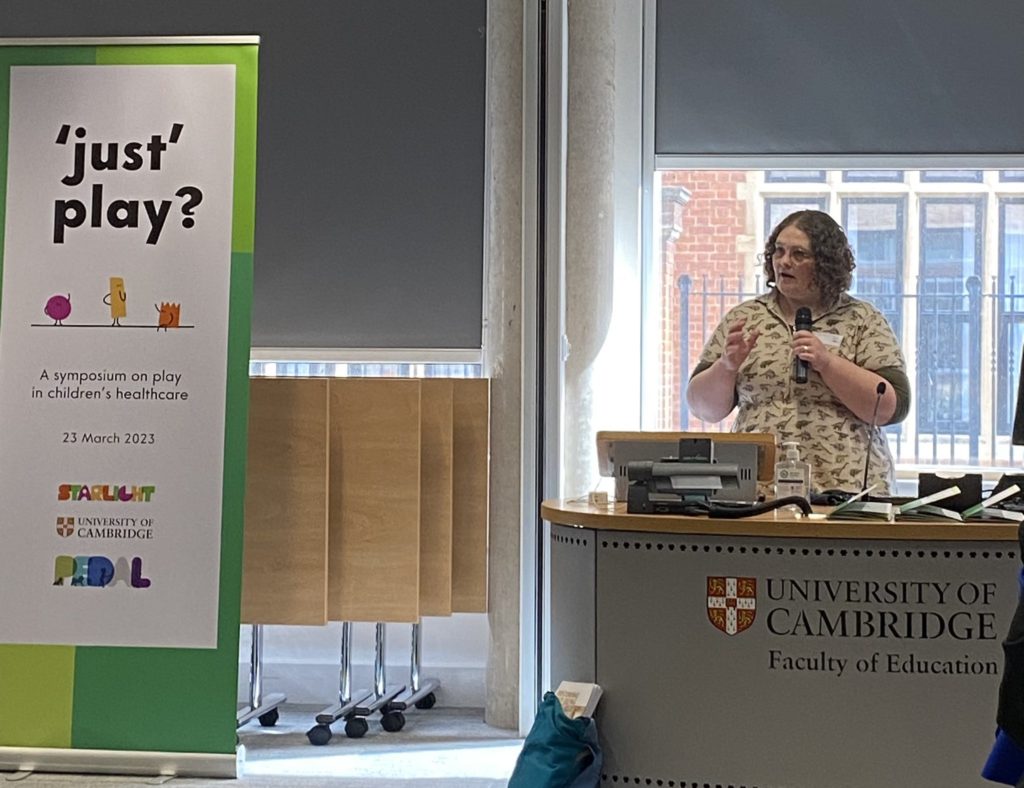29 March 2023
 ‘just play’? A symposium on play in children’s healthcare
‘just play’? A symposium on play in children’s healthcare

Last week we had the chance to attend “‘just’ play? A symposium on play in children’s healthcare,” co-hosted by Starlight and PEDAL (The Centre for Research in Education, Development and Learning). It was a fantastic opportunity to hear from speakers on a range of topics and to participate in discussions about the future of play within healthcare.
From keynote speaker Professor Imelda Coyne (School of Nursing and Midwifery, Trinity College, University of Dublin) to Charlotte Fairall (parent and CEO of Sophie’s Legacy), to Cath Hubbock (Senior Health Play Specialist and author), there was a huge wealth of experience and knowledge represented during the symposium.
There were many fascinating topics explored on the day – one which recurred through was putting the voices and needs of children and young people at the heart of decisions about play in children’s healthcare. It was a topic we were particularly interested to hear about as we continue on our own journey to make the child’s voice more prominent within our own work (If you’d like to find out more about this, click here to read Kristie’s story).

Kelsey Graber (a doctoral student at PEDAL) presented her research into children’s perspectives on play in hospital. Her examples, taken from videos of semi-structured interviews with children as young as 3, showed clearly that children used play to communicate their experiences, feelings, needs, and wants. Children who struggled to answer questions about themselves directly were able to express their views by projecting their experiences and feelings onto an imagined character, represented through a wooden figure which Kelsey offered them for this purpose. The children became absorbed in their imagined worlds, and their enjoyment of play was evident during the interview itself. Beyond enjoyment or ‘just fun’, initially reticent children became more confident as they engaged with play and became more communicative over the course of the interviews.
Kelsey’s research provides persuasive evidence that even very young children are able to express their needs and preferences through play (DeCosta, 2021). Feeling that adults have the time to listen to them, and that they really care about what children and young people are expressing helps children feel valued as individuals and nurtures their wellbeing. It’s easy for busy adults to assume children and young people won’t notice their inattention or rushed approach, but Kelsey’s research has given young patients the chance to speak in their own time and manner, revealing that they do indeed notice these things. If a consultant checks their watch, or stands in the doorway when they say, ‘Do you have any questions?’ children notice and feel that queries and anxieties that they may want to raise represent an unwelcome drain on time for the professionals who are caring for them.
Our hosts, Starlight and PEDAL are both contributing hugely to the field of play in children’s healthcare – we’re so grateful for the opportunity to hear in more detail about their research and developments, and for the chance to come together and participate in the conversations about this important topic. Seeing growing attention being given to this important area of children’s healthcare fills us with hope for the future, and we’re excited to see where research like Kelsey’s takes us when it is published and available to a wide audience.
